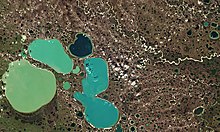
Back التغير المناخي في روسيا Arabic Климатски промени во Русија Macedonian Изменение климата России Russian

Climate change has serious effects on Russia's climate, including average temperatures and precipitation, as well as permafrost melting, more frequent wildfires, flooding and heatwaves. Changes may affect inland flash floods, more frequent coastal flooding and increased erosion reduced snow cover and glacier melting, and may ultimately lead to species losses and changes in ecosystem functioning.[1]
Russia is part of the Paris Agreement that the rise in global average temperature should be kept way below 2 °C. Since Russia is the fourth-largest greenhouse gas emitter in the world,[2] action is needed to reduce the impacts of climate change on both regional and global scale.
- ^ Cite error: The named reference
IPCC2007was invoked but never defined (see the help page). - ^ "Historical GHG Emissions". Retrieved 18 May 2021.